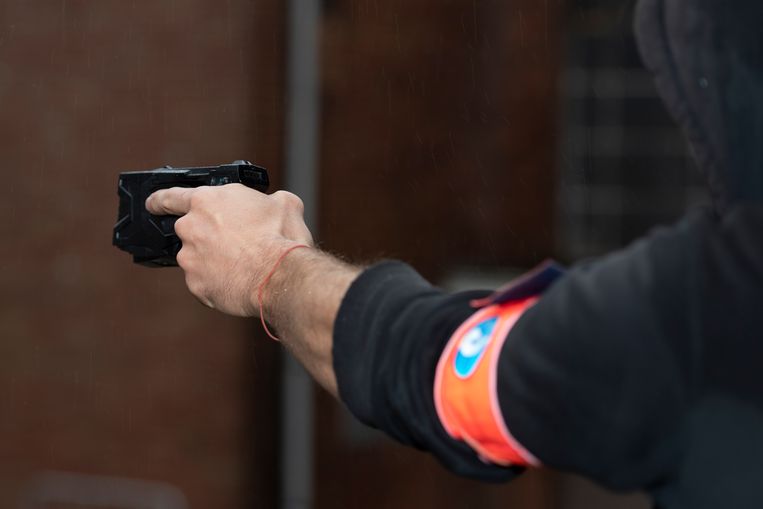A pilot project has been launched in several Belgian police zones to evaluate whether Tasers, a controversial weapon that temporarily incapacitates a target by stunning them with high voltage, should be included in standard police equipment.
The weapon would be intended primarily for self-protection, the cabinet of Home Affairs Minister Annelies Verlinden confirmed.
"The intention is that when police officers are carrying out their duties, they should have sufficient instruments at their disposal to protect themselves," Verlinden's spokesperson Peter Poulussen told The Brussels Times.
The call for Tasers came from the police and the proposal has been on the table since before Verlinden took up the role of Home Affairs Minister. At the end of 2022, the pilot project will be evaluated, before deciding whether the weapons will be rolled out. "Following the pilot phase, we will look at how often tasers were used, why they were used or in what situation, and in what way," Poulussen said.
He stressed that, as is the case with any other weapon, officers will be trained to use the Tasers prior to being issued one. "They will also have to justify why they used the device after an incident."
As is the case with guns, officers will probably rarely or never have to use them.
Controversy and cost
A Taser fires two small dart-like electrodes that are connected to the device with thin wires and can penetrate clothing. Once they come in contact with a person, these deliver an electric shock, disrupting a person's nervous system and temporarily paralysing them. A target can be Tasered up to a distance of around 11 metres.
The devices have been widely used by police officers in the United States for almost two decades. According to a Reuters report, more than 1,000 deaths in the country have been attributed to their use.
Related News
- Worrying increase in illegal guns and related violence in EU, study reveals
- 'Unpunished reality': Belgium will gather testimonies to map police violence
In Belgium, police unions welcomed the extra protection for officers but argued that there is too little money for proper training, raising safety concerns if they were issued widely.
"The tactical and practical procedures must be reviewed," Luc Breugelmans of ACOD told De Morgen. "Officers need to test the use of the Taser but that will cost money."
There is also a fear for the legal framework in case of death following the Tasering of a person; unions are calling for clear legal protection.
"It could be that someone with a weak heart is hit and dies from the consequences," Breugelmans explained, adding that an officer wouldn't know about underlying conditions in advance, meaning they cannot be held responsible for such outcomes.

